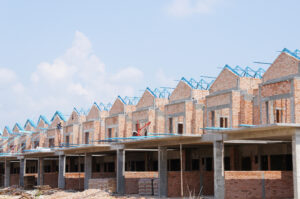 To address the nation’s rental housing shortage and affordability crisis, Freddie Mac Multifamily is ramping up financing to support newly constructed or substantially rehabilitated multifamily housing. The company will leverage new flexibilities granted by the Federal Housing Finance Agency (FHFA) that allow for more use of forward commitments, which are agreements to purchase loans at a later date with certain financing terms locked in today. The agreements provide greater certainty to construction lenders and housing developers by limiting risks they face when executing complex multifamily deals in volatile markets. Freddie Mac proposed greater use of forward commitments in its Equitable Housing Finance Plan.
To address the nation’s rental housing shortage and affordability crisis, Freddie Mac Multifamily is ramping up financing to support newly constructed or substantially rehabilitated multifamily housing. The company will leverage new flexibilities granted by the Federal Housing Finance Agency (FHFA) that allow for more use of forward commitments, which are agreements to purchase loans at a later date with certain financing terms locked in today. The agreements provide greater certainty to construction lenders and housing developers by limiting risks they face when executing complex multifamily deals in volatile markets. Freddie Mac proposed greater use of forward commitments in its Equitable Housing Finance Plan.
“One of the most complicated factors in determining how, where and when to build or rehabilitate a multifamily property is market uncertainty, and that’s particularly true right now,” said Stephen Johnson, VP of Production & Sales at Freddie Mac Multifamily. “Our forward commitment program can take some of those concerns off the table, allowing construction lenders, developers, nonprofits, municipalities and others working to support affordable housing to get the math right and move forward. This move will help us add or preserve thousands of affordable multifamily housing units every year.”
FHFA previously subjected forward commitments to Freddie Mac’s annual production cap ($78 billion for 2022), but will now exempt a certain amount ($3 billion for 2022) of forward commitments from the cap. Separately, FHFA is lifting its $500 million cap on forward commitments for properties that do not benefit from a Low-Income Housing Tax Credit (non-LIHTC forwards). The company’s non-LIHTC forward business will instead be subject to the annual exemption on forwards, along with LIHTC forwards.
Freddie Mac’s Equitable Housing Finance Plan underscores the GSE’s ability to work across the industry and with the FHFA to create opportunities for all families to access quality and affordable housing and to set new standards that bring more individuals closer to their American Dream.
“Freddie Mac’s Equitable Housing Finance Plan looks closely at current housing environment and puts forth meaningful and challenging solutions that advance equitable and sustainable ownership and rental opportunities for all,” said Michael J. DeVito, CEO of Freddie Mac. “It is part of Freddie Mac’s effort to serve our mission expansively by increasing access, expanding credit responsibly and bringing greater access to the American Dream.”
Freddie Mac has long used forwards to finance some of the nation’s most complex but important affordable housing developments:
- Historic Investment in Tulsa: In 2017, Freddie Mac provided $13.7 million in a 9% Low-Income Housing Tax Credit (LIHTC) forward commitment to River West in Tulsa, Oklahoma. The property now provides 222 housing units across a community of walk-up buildings and townhouses. More than three-quarters of these units are restricted to 50-60% area median income (AMI). The 21 unrestricted units will have asking rents in line with 60% AMI rent levels. LIHTC units will benefit from project-based Section 8 vouchers that limit rents to 30% of a tenant’s annual income. There will be six phases of housing development. Freddie Mac has invested $40 million of LIHTC equity in the first four phases through its syndicator RBC Community Investments LLC.
- Hope for the Homeless in the City of Angels: In 2021, Freddie Mac provided a $50 million in Tax-Exempt Loan forward commitments to finance Hope on Avalon, as well as two sister projects, Hope on Broadway and Hope on Hyde Park. When completed, the properties will provide permanent supportive housing and transitional units, with three on-site managers, for 294 formerly homeless residents. The properties will be in South/Central Los Angeles, approximately 11 miles south of the central business district.

 theMReport.com Your trusted source for mortgage banking news
theMReport.com Your trusted source for mortgage banking news








